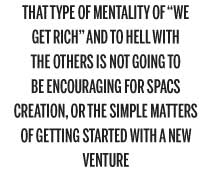
Innovation is the best way — the only way — out for economies such as ours that were hit by the surge of Covid. But, it’s almost a given — the word is ‘axiomatic’ — that new initiatives in business and entrepreneurship should come from private speculators and others in the investment business, plus those with start-up ideas.
But the local start-up ecosystem has so far not delivered. It’s because the investors so called have been conventional and that’s the last thing that a culture of innovation should buy into. 70 percent of the country’s GDP comes from the Small and Medium Entrepreneur sector, but investors have been loathing investing in small scale start-ups — preferring the listed giants instead.
Contrast this to China for instance, where private-public partnerships have targeted start-ups in large numbers. The start-up culture has not been primed in this country, and the private sector venture capitalists are remiss in this regard.
Besides that, the regulatory framework is still lagging. There has been some talk about our Stock Exchange (CSE) gearing up to entertain SPACS. But that initiative never got off the ground. What are SPACS or Special Purpose Acquisition Companies?
These are shell companies that open an IPO for investment, without having any functioning business operational to attract funds. Instead the shell companies raise funds promising to target a business for acquisition, within a given time period.
Punching
Such an arrangement obviates the costly outlays for companies to launch their own IPOs. That’s particularly helpful during Covid-related restrictions when normal social interaction is minimal and companies are unable to launch the roadshows and the other preliminaries associated with a regular IPO.
The Singapore Stock Exchange is already preparing to list SPACS. Somebody may say Singapore is a different case, with huge infusions of cash and good will from global investors, but that seems to be the whole point. There is nobody here that’s willing to take the chance in punching above their weight and striving to make our location an investment hub.
 Every venture capitalist and investor here sticks to the straight and the narrow and insists on copious tons of paper-work and sophisticated pitches. Nobody is willing to go by their instincts. Besides, a startup ecosystem can never be launched from a top down perspective, where the investor is almighty and the guy who makes the start-up pitch is seen as a supplicant. But that’s what happens in this country, and it won’t do to initiate new enterprises if we stick to an absurd hierarchical entrepreneur culture.
Every venture capitalist and investor here sticks to the straight and the narrow and insists on copious tons of paper-work and sophisticated pitches. Nobody is willing to go by their instincts. Besides, a startup ecosystem can never be launched from a top down perspective, where the investor is almighty and the guy who makes the start-up pitch is seen as a supplicant. But that’s what happens in this country, and it won’t do to initiate new enterprises if we stick to an absurd hierarchical entrepreneur culture.
This aspect of the issue has deeper cultural underpinnings. At a given time our nation is celebrating all types of so-called good governance advocates, but there is no trust placed in the innovative capability of a start-up entrepreneur. Recently this writer saw an article that was going into ruptures about not one but seven so called good governance advocates.
Dubious characters
Some are dubious characters in themselves, but no matter, these are the celebrities that our hierarchical culture wants. Those who celebrate these folk can then lecture to the rest of society as well. Hierarchical indeed, if you get to lecture and hector, cheering on good governance smart-alecks instead of much more creative people that are generating new business ideas.
The same problem bedevils the idea of a SPACS initiative in Sri Lanka too. Shell companies need strong leaders who ought to be trusted by the investors because they are essentially selling a blank cheque company.
Nobody knows what the SPACS are going to invest in, though they may have a vague idea. However, it was a SPACS that got Virgin Galactic to merge with it because that’s what Richard Branson of Galactic chose to launch his IPO — a SPAC.
But Sri Lankan entrepreneurs start from a very different place. The culture is geared towards show-offs and other flamboyant characters. Investors here are less keen in the thrill of a start-up than they are about showing off their money driving flashy four-wheel drive monsters.
That sort of culture is not conscientious nor is it about growing to appreciate the joys of entrepreneurship. Instead, it’s hierarchical and mostly vacuous. Investors that spend their energies showing off their massive houses and flashy four-wheel drives have no energy to fund startups with any degree of real enthusiasm.
It’s also essentially not a culture that revels in the success of another person. So, the venture investor culture here exists to celebrate the investors who are invited at the drop of a hat to natter around at seminars.
This sort of hierarchal behaviour doesn’t generate the vibes that encourage innovation in any start-up ecosystem. People intent 24/7 on impressing others with their massive houses and flashy tanker like off road vehicles, are not the ideal fit to invest in start-ups because they have no time for the young minds that seek to innovate. They often see such collaborations as being beneath them.
Our start-up ecosystem is also notoriously risk averse — and so is the ‘infrastructure’ i.e the man made regulatory systems that baulk at ideas such as SPACS.
Just imagine the kind of quantum mental leap that’s required to make a SPAC start-up system work. Investors have to place their faith in a shell company that’s promising everything, but has nothing really to show for it.
That type of risk is abhorrent to the mindsets of our hierarchically minded investor community. Additionally, they can’t ‘flex’ i.e hector the shell company’s leadership because that entity would be dealing in intangibles. Imagine a situation in which a company promises to raise the money — just because they are to be trusted — and then takeover another company in a business merger that’s not yet identified?
That’s a bridge too far for our rather inflexible investors, who have to be treated deferentially to power-point presentations preferably with laser-light shows and some smoke and mirrors as well.
The investors and venture capitalists want the Government to get involved and fund investment, but on the one hand that’s not the correct attitude even though Government funded start-ups have in other countries created good entrepreneurship ecosystems.
Apart from a few start-up hubs that try to create conditions such as co-working spaces and so on for young minds to generate ideas, there is nothing for the innovative to rely on except a bunch of leering, hectoring investors who are ever ready to talk down to the folk they see as underlings. This is the antithesis of a productive start-up ecosystem. Such a constructive dynamic should be built on mutual respect, as after all, the investment of the venture capitalist would flourish only if the startup of the neophyte investor is any good.
Regulatory
All these steps in getting a new business off the ground, therefore, are very mindset-dependent. But the investor community is waiting most often for the State to give them the money so that they can then in turn lend the money and be glorified as the start-up merchants.
That type of mentality of “we get rich” and to hell with the others is not going to be encouraging for SPACS creation, or the simple matters of getting started with a new venture. This culture would begin to change if some start-up authors succeeded, and then later put their money into venture capitalism themselves.
Unless they too have been taken over by the hedonistic urge to show off massive houses and monstrous four wheel drives, these people would have some empathy for fresh minds focusing in start-ups because they have been there and know what it takes.
There is something the Government can do, and that’s to free up the regulatory space. The Government could also begin funding start-ups but not in a top-down style but by simply facilitating the cash. The less middlemen there are the better.
But there is no ecosystem that’s developed enough to identify smart start-up material, and take charge of the dynamics of funding new ventures. Our capitalists need to outgrow their mentality of trying to be the centre of everything and start spending money in situations in which they are stakeholders and not bosses who hector and harass the innovative folk, who are after all, the fulcrum that give movement to any delivering start-up dynamic.
